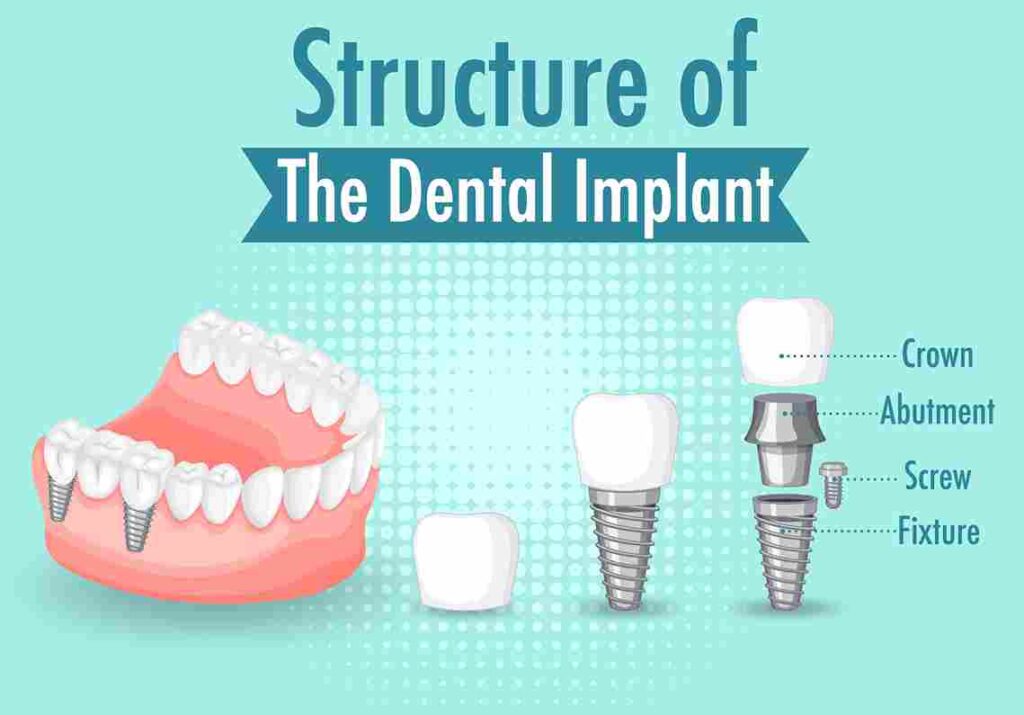Full Mouth Dental Implants are one of the most popular options for replacing missing teeth. They offer a natural-looking, long-lasting solution and are much more comfortable than dentures. However, they’re also a significant investment, so you must understand everything about them before deciding. This guide will cover everything you need to know about dental implants, from the basics of how they work to the different types available.
What are Dental Implants?
Dental implants are artificial tooth roots placed in the jaw to hold a replacement tooth or bridge. Dental implants may be an option for people who have lost a tooth or teeth due to periodontal disease, an injury, or other reasons. Dental implants are made of titanium, a material compatible with the human body.
The implant is placed in the jawbone and allowed to fuse with the bone over several months. This process is called Osseointegration. Once the implant has merged with the bone, it acts as a new root for the replacement tooth or bridge. Implants are a good option for people who want to avoid wearing dentures or have trouble with dentures staying in place. Implants can also help preserve facial structure and prevent bone loss when teeth are missing.

The Different Types of Dental Implants
When it comes to dental implants, there are several different types that you can choose from. Each dental implant has its benefits and drawbacks, so you must consult your dentist to see which one is right for you. The most common type of dental implant is the end steal implant, made from titanium. This implant is inserted into the jawbone, and an abutment is placed on top.
The advantage of this type of Full Mouth Dental implant is that it’s firm and stable. However, the disadvantage is that it can take a long time to heal, and there’s a risk of the implant being rejected by the body. Another type of dental implant is the sub-periosteal implant, which sits on top of the jawbone instead of being inserted into it. This type of implant is less invasive than the endosteal implant but is not as solid or stable.
However, it can be a good option for people with thinner bones or at risk for rejection. Finally, there are mini implants, which are much smaller than traditional implants. Mini implants are less invasive and have a shorter healing time.
Pros and Cons of Full Mouth Dental Implants:
There are many reasons to consider dental implants, but there are also some potential drawbacks. Here, we will explore some of the pros and cons of dental implants so that you can decide whether they are right for you.
Pros:
- Dental implants can give you back your smile.
- They are a permanent solution to tooth loss.
- Dental implants can improve your overall oral health.
- They can increase your confidence and self-esteem.
- Dental implants are a natural-looking solution for tooth loss.
- They allow you to eat the foods you love without restrictions.
- They are durable and long-lasting with proper care.
- Dental implants are low maintenance compared to other tooth replacement options.
- They don’t require special care or cleaning products –brush and floss as normal!
Cons:
- The initial cost of dental implants can be high.
- The surgery required for dental implants carries some risks, as with any surgery.
- There is a slight chance that the implant may not fuse correctly with the jaw.
What is the Process of Getting Dental Implants?
The process of getting a full mouth dental implants is quite simple. First, you must consult your dentist to see if you are a good candidate for the procedure. If you are, your dentist will refer you to an oral surgeon.
The oral surgeon will then evaluate your mouth and jaw to determine if you are healthy enough to undergo surgery. The oral surgeon will place the implant into your jawbone if you are. Once the implant has healed, you will need to return to your dentist to have the artificial tooth placed on top of the implant.

How to Care for Your Dental Implants
Dental implants are a great way to replace missing teeth and give you a beautiful smile. But like all dental work, they require proper care to keep them looking their best. Here are some tips on how to care for your new dental implants:
-Brush and floss your teeth twice daily to remove plaque and bacteria. Be sure to use a soft-bristled toothbrush and be gentle around your implants.
-Visit your dentist regularly for checkups and cleanings. They will be able to spot any problems early and help keep your implants healthy.
-Avoid smoking, which can cause implant failure. If you do smoke, quit as soon as possible.
-Eat a healthy diet of fruits, vegetables, and whole grains, which will help keep your gums healthy and prevent disease.
-Be careful with hard foods. Avoid crunching on ice or hard candy, and cut up tough meats before eating them.
-Wear a mouth guard if you play sports or participate in any activity that could cause an injury to your mouth. Following these simple tips, you can enjoy your new dental implants for many years!
How long after dental implants can I eat normally?
You may be wondering how long after dental implants you can eat normally. The answer is that it depends on the individual. Some people may be able to eat immediately after the surgery, while others may need to wait a few days. It is essential to listen to your body and give it the time it needs to heal. If you try to eat too soon after the surgery, you may risk damaging the implants or causing an infection.
Can dental implants be removed?
Yes, dental implants can be removed. However, the removal process is typically more complex and involved than the placement process. In most cases, the implant must be surgically removed, which can be a complicated and delicate procedure. Additionally, the surrounding teeth may need to be removed or stabilized before the implant can be successfully removed. Therefore, it is essential to consult with a qualified dental professional before deciding to remove a dental implant.
Can dental implants cause neurological problems?
There is no clear evidence that full mouth dental implants can cause neurological problems. However, some people have reported experiencing headaches, dizziness, and tingling after dental implants. These symptoms may be related to the implantation procedure or the material used in the implants. Some people may also be more sensitive to foreign objects in their bodies, which could account for the reported symptoms. Overall, the evidence is inconclusive and more research is needed to determine if there is a link between dental implants and neurological problems.
Alternatives to Full Mouth Dental Implants
If you’re considering full mouth dental implants, you’re not alone. This popular tooth replacement option is chosen by millions of people every year. But it’s not the only option available. If you’re looking for alternatives to dental implants, here are a few options:
- Dental bridges. Bridges are commonly used to replace one or more missing teeth, and they consist of artificial teeth, called pontics, which are anchored in place by dental crowns. Natural teeth or implants can support bridges.
- Partial dentures. Partials are another option for replacing one or more missing teeth, and they usually consist of a metal framework with artificial teeth attached. Partials can be removable or permanently attached (fixed).
- Complete dentures. Dentures are an option for people who have lost all of their natural teeth. Complete dentures consist of artificial teeth in a pink base resembling gum tissue. Dentures can be removable or fixed in place with dental adhesives.
- All-on-four dental implants. This newer technique uses just four implants to support an entire arch of artificial teeth (upper or lower). All-on-four implants
Conclusion:
We hope you have enjoyed our complete guide to full mouth dental implants. If you are considering dental implants, we encourage you to schedule a consultation with your dentist to discuss whether they are right for you. Dental implants can offer an excellent solution for those missing one or more teeth and help you regain confidence and improve your oral health.
 Skip to content
Skip to content
